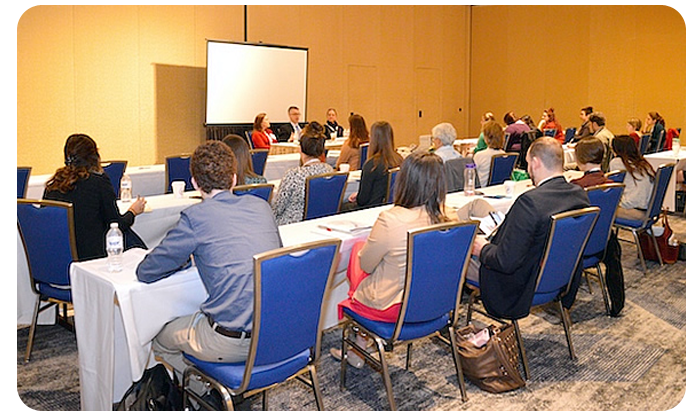By Morgan Mapstone,
Bulletin Correspondent
Reporting on child-related crises requires being both a journalist and a human being, according to Jennifer Berry Hawes.
Hawes, projects reporter at the Post and Courier of Charleston, S.C., and winner of the 2015 Pulitzer Prize for public service, was one of three panelists at a workshop Friday, Feb. 24, titled “For the sake of the children … Reporting responsibly on kids in crisis.”
About 25 people attended the workshop at the New England Newspaper and Press Association winter convention. The discussion, moderated by John Voket, associate editor of The Newtown (Conn.) Bee, explored the challenges and solutions to reporting on kids after traumatic events.
As a reporter during a Charleston church mass shooting in 2015 that resulted in a man’s killing nine victims, Hawes has experienced the impact press coverage can have on the lives of young victims. In her eyes, kids aren’t being protected as they should be in reporting today.
“There used to be a day when stories went straight to archives,” Hawes said. “That stuff is out there forever now.”
Panelist Lisa Jones, a research associate professor of psychology at the Crimes against Children Research Center at the University of New Hampshire, discussed responses to news reports.
“When a youth is reported in an article, it is an involuntary disclosure,” Jones said.
Jones said that whenever a news story discloses information, the subject of the story gets both positive and negative responses back from the public. Jones said that, in her experience, negative responses tend to overshadow positive responses victims receive, affecting a young child throughout his or her future.
A victim’s identity sometimes is not protected in reports long after the incident occurs. Jones discussed the decision to disclose information and its continuing effect on a victim’s well-being in future reporting.
“It’s important to remember there is also decision-making needed months and years after the event,” Jones said.
Panelist Robert Franks, president and chief executive officer of Judge Baker Children’s Center in Boston, discussed the state of mind of a child after a life-altering event.
“You’re dealing with someone with a significant loss of control,” Franks said.
After life-changing trauma, victims can experience post-traumatic stress disorders. Memories of the event can be re-lived when triggered by traumatic reminders. Franks said the way journalists cover stories can contribute to those traumatic reminders.
“As journalists, we don’t think of trauma as the long-term disease it is,” Franks said. “Everyone responds differently to trauma.”
Panelists gave advice on the use of different interviewing methods to avoid harming the mindset of a victim.
Hawes said she does all of her interviews on the record, but offers an option to the person being interviewed to contact her with any concerns after the interview. That option gives authority to a victim who has lost a sense of control, she said.
“I tell the person I’m interviewing ‘If you feel uncomfortable with any of the information you give me after the interview, tell me’,” Hawes said.
She thinks that the most effective way to approach someone after a traumatic event is to talk to someone in common with the victim.
“I try to reach out to people through a trusted friend,” Hawes said. “It gives a buffer and encourages the victim to trust and cooperate.”
NEWS

‘As journalists, we don’t think of trauma as the long-term disease it is. Everyone responds differently to trauma.’
—Robert Franks, President, chief executive officer
Judge Baker Children’s Center

‘I tell the person I’m interviewing “If you feel uncomfortable with any of the information you give me after the interview, tell me.”‘
—Jennifer Berry Hawes, Projects reporter
Post and Courier, Charleston, S.C.


The audience of about 25 people listens to the panel on ‘For the sake of the children … Reporting responsibly on kids in crisis.’

